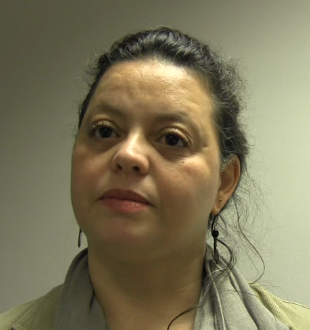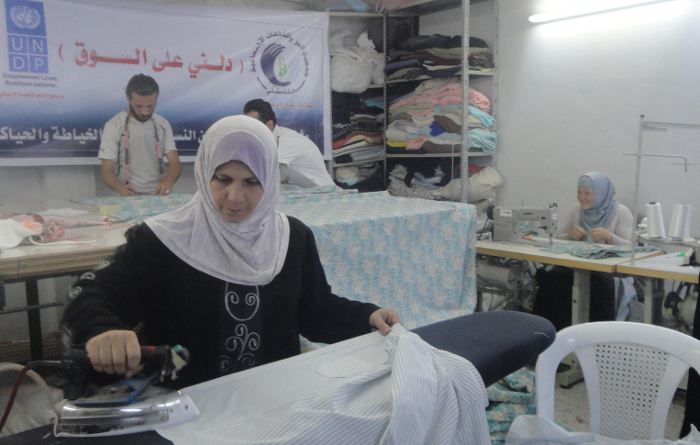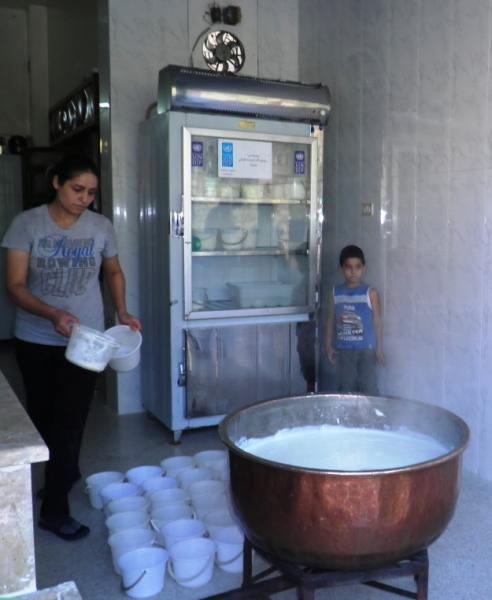Every day on the news we hear about the atrocities that are occurring in Syria or about the refugees who have fled to other countries. But what about the people left behind who are still living in the midst of a warzone? How do you maintain a daily routine in a conflict affected country? During a recent visit to Brussels, Alissar Chaker, the Deputy Country Director of the United Nations Development Programme (UNDP) in Syria, spoke to capacity4dev.eu about what the UNDP is doing in Syria to alleviate socio-economic pressures in affected communities.
| The European Union, together with its member states, has contributed over € 1.9 billion to addressing the Syrian crisis, making it the largest donor. The EU itself is heavily involved in the humanitarian and rehabilitation response to the war in Syria, in a coordinated effort with UN agencies. For example, the EU is channelling its effort through UNICEF to assist with education needs in-country, and through UNWRA to address needs in refugee camps. The 2013 Special Measure, which is expected to be adopted in mid-October 2013, will allocate approximately € 5 million support for the early recovery and income generation activities that the UNDP is supporting in Syria. With this special measure, the EU will also assist with protecting cultural heritage sites and assets that have tourist value, through UNESCO. |
What is the UNDP working on in Syria at the moment?
|
Image

|
|
Alissar Chaker Deputy Country Director UNDP Syria |
The Syria crisis has left more than 6.8 million people in dire need. Every day, thousands are leaving their homes to travel to safer areas, or fleeing across the borders. At least 4.25 million people have taken shelter in public buildings, community shelters, or with host families. Given the protracted nature of the crisis, coping mechanisms are under increasing pressure due to limited resources and depleting savings among both internally displaced people and host communities. This has further exacerbated pre-existing levels of poverty and unemployment, especially in rural areas. It has been reported by various agencies that the lack of security is not the only significant reason for displacement. A relatively large number of people have fled due to the scarcity of livelihoods and income, lack of access to basic services, and destruction of basic community infrastructure in their home towns and villages.
Accordingly, UNDP Syria is mainly focusing on enhancing resilience in communities through quick impact projects for restoring and stabilizing livelihoods and facilitating income generation to avoid further destitution, marginalisation and dependence on aid. Special focus is put on vulnerable groups such as IDPs, youth, women-headed households and people with disabilities. Our projects include labour intensive emergency employment for repairing basic community infrastructure and improving service delivery (such as cash-for-work schemes to collect solid waste and remove debris), as well as provision of emergency support for the restoration and stabilisation of disrupted livelihoods (ex. start-up grants, assets replacement and targeted vocational training). We also promote social cohesion and reconciliation through community-based psycho-social support, capacity development of local NGOs/ CBOs to engage in early recovery efforts, and peace-building community activities.
UNDP is also leading the Early Recovery and Livelihoods Sector Working Group, which comprises other UN Agencies, international organisations, national and international NGOs. The key objective of the Working Group is to ensure coherence and optimisation of resources for early recovery interventions and provide technical support on mainstreaming early recovery in humanitarian response. The working group meets bi-weekly for exchange of information and discussion of current issues, priorities, trends and planned response. It contributes Early Recovery and Livelihoods updates to the humanitarian bulletin and dashboard, provides peer review for agencies’ submissions to the Central Emergency Response fund and the Emergency Response Fund, and coordinates the development and monitoring of the relevant chapter of the Syria Humanitarian Response Plan.
Can you please elaborate on the work that you’re doing on start-ups?
For example in Homs Governorate, which was one of the governorates that before the crisis had a number of industries and a very vibrant commercial life, UNDP is supporting, in partnership with local NGOs, groups of young people to start their own businesses. Support includes start-up grants, asset replacement and technical assistance The businesses vary and include for example cement blocks manufacture, sewing workshops, used garment repair and cleaning facilities, an ice factory that will also be used for freezing agricultural products to lengthen their shelf-life, growing mushrooms in cellars, roof-top agriculture, and various other commercial facilities. In rural Damascus, start-up kits and vocational training are provided to affected women to start their own businesses. It is a way to inject some cash into communities for re-stimulating the local economy and helping spontaneous recovery.

Women at a sewing workshop in Qamishli. Photo courtesy of UNDP.
In Hama Governorate, UNDP is supporting the establishment of milk processing units in various villages to support the livelihoods of small milk producers (1 to 2 cows). This came as a response to the disruption of markets and the increasingly unsustainable prices imposed by wholesalers on small producers who are already burdened by the crisis. UNDP facilitated work and the employment of local labour, provided all the necessary equipment and tools for milk processing, as well as corresponding vocational and health and safety training.

A milk processing unit in Hama. Photo courtesy of UNDP.
How does UNDP operate in Syria under the current situation?
UNDP currently has 3 international and around 100 national experts and practitioners inside Syria, located in Damascus and in field offices. Field staff are present in Hama, Hassakeh, Latakia, Homs, Tartous, Aleppo and Deir Ezzor and expansion is foreseen; security permitting. The UN-hubs in Homs and Tartous are also facilitating the comprehensive implementation of the UN response plans in these governorates as well as in neighbouring governorates. The solid and long-standing partnerships of UNDP with local communities including NGOs, local associations and representatives of local communities is facilitating access to affected and hard to reach communities such as Aleppo and Deir Ezzor in addition to some areas in Rural Damascus.
Given the security situation, UNDP had to temporarily relocate its head offices to a safer neighbourhood in Damascus. With other UN agencies, it has implemented the necessary security mitigation measures to limit security risks and threats on UN personnel both at the new premises and in the UN hubs. Movement inside as well as outside the city is only by armoured vehicles.
The office functions on light footprint during peak security events and accordingly all staff are equipped to work remotely or from home to ensure continuity of UNDP operations. We rely heavily on technological solutions and corporate systems and repositories during these periods to maintain regular contact with the office and with colleagues in the field, and access key documents.
The UN/ UNDP avails to all personnel in Syria counselling services, as well as security trainings to raise awareness on likely security threats and instil safe practices and good behaviour.
Ms Chaker recently attended an Inter-Agency Workshop in Brussels, on Strengthening Cooperation in Fragile and Conflict-Affected Countries.
You are currently following an Inter-Agency workshop on Strengthening Cooperation in Fragile countries. How has this seminar been useful for you and the work that you’re doing in Syria?
I think it is very useful because it brings different perspectives to the table. We discussed a lot of the technical aspects and our respective policies and programming instruments. We were surprised that there are a lot of common grounds among the various participating organisations that are hard sometimes to see from a distance. For example, a lot of effort is being put by the EU on aid effectiveness and coordination to link stabilisation with development and this mirrors the thinking within the UNDP and the UN system in general.
Fragile states are very sensitive and very flux. Therefore, we need to advocate jointly and send common messages on key issues, such as international humanitarian laws and principles, protection of civilians and humanitarian workers, etc., as well as to coordinate our approaches for increasing the chances of success. One agency cannot do everything. We need to partner where possible or coordinate with each other for better complementarity, value added and impact of interventions. Having a coordinated approach in Syria is key as the stakes are high and human suffering has reached high peaks.
Are there any sessions that have been particularly interesting?
I found the aid coordination session very interesting because it was an eye-opener for those coming from the field on the thinking and new developments at headquarter level but also to discuss the political, logistical, programmatic, security and operational implications of conditionality and certain funding decisions and instruments.
For more information about what the UNDP is doing in Syria, you can visit their Responding to the Crisis in Syria webpage.
This collaborative piece was drafted with input from Alissar Chaker (Deputy Country Director of the UNDP in Syria) and Raniero Leto (Head of Operations for the EU Delegation to the Syrian Arab Republic), with support from the capacity4dev.eu Coordination Team.

(1)
Log in with your EU Login account to post or comment on the platform.
The United Nations Development Programme (UNDP) recently published a video show showing how the European Union (EU) and UNDP are working together to build resilience in Syria. Between January and September 2014 both organisations collaborated to restore and stabilise livelihoods including the creation of thousands of jobs.
You can watch the video in the Fragility and Crisis Situations Group: http://capacity4dev.ec.europa.eu/public-fragility/blog/eu-undp-response…